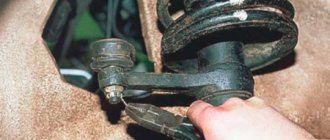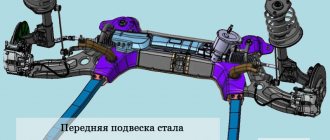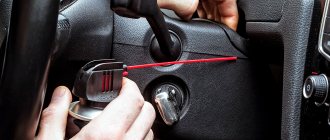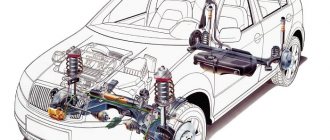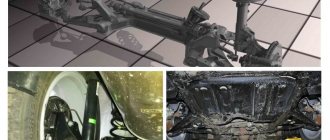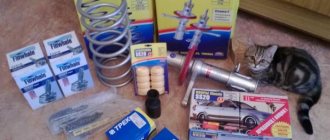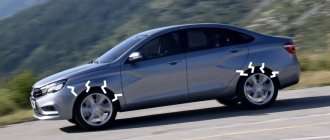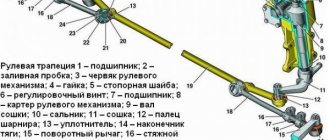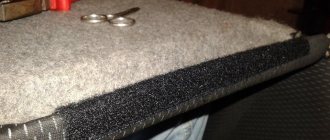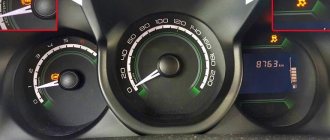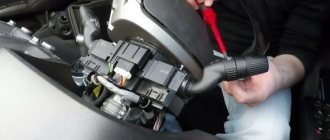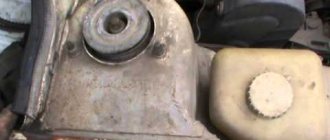The front and rear suspension of Vesta differs significantly from the one that AVTOVAZ used on Grant, Priora, Kalina, etc. All the reviews tell us that the new chassis design is better than before. However, during the first months of operation, the owners began to notice extraneous noises (knocks, creaks, rattles, crunches) in the front and rear suspensions of Vesta, which occur when driving over speed bumps or other road irregularities...
Grinding, creaking in the front suspension
A dull sound, as if the racks are touching the plastic, or a creaking sound reminiscent of rubber friction. The reason is the poor quality of the stabilizer bushings (No. 8) or insufficient lubrication of the muffler mounts .
It is enough to lubricate the gingerbreads (muffler mounts) with grease. There is no point in lubricating the rubber bushings of the stabilizer, because... this doesn't last long. You can solve the problem of front suspension squeaking like this:
- replace the standard stabilizer bushings with polyurethane ones (catalog number: 17012680).
- install analogue bushings.
- place a piece of rubber under the bushings (see video below).
- Since February, AVTOVAZ has been replacing the old-style stabilizer bar with a new one under warranty.
Question to AVTOVAZ: When will the problem of squeaking bushings be resolved? New cars from October-November continue to creak.
Answer: Improvements were introduced (replacement of rubber, lubricant) at the end of November 2016.
A knock in the front suspension may occur due to wear of the stabilizer struts (No. 7) (replacement), which should be replaced with new ones. This case is discussed in the video:
Also, knocking noise from the front of the car can come from the upper engine mount or from the brake caliper.
conclusions
If the service life of some units has come to an end, then they need to be replaced urgently, since one breakdown can lead to others, and the entire mechanism will go into disarray.
If we return a little to squeaks, then with significant fatigue of the ball joints, steering tip and rack, failure of the shock absorber, or its broken supports, unnatural irritating sounds may appear. Then it is best to go for a diagnosis and then treat the problem.
Despite the fact that a modern car is not only a high-tech vehicle and is manufactured to the most advanced standards. Even they have problems. These faults can manifest themselves as a knocking sound in the front suspension of the Lada Vesta.
Although the suspension turned out to be successful, malfunctions periodically arise, which the manufacturer analyzes and makes recommendations for eliminating squeaks in the Lada Vesta. They may appear as extraneous sounds or knocks.
Knocks, crunching in the rear suspension
In the rear suspension, knocking is eliminated according to the instructions of AVTOVAZ. It is necessary to remove the rear shock absorber strut and place a washer under the upper support (No. 5).
It is worth noting that after such modification, a gap appears between the support and the body, into which dirt can get in. To eliminate this, it is recommended to install a gasket according to the following dimensions:
Other sources of extraneous noise from the rear:
- handbrake cable (fasten to ties);
- trunk lid dampers (lubricate with silicone grease, loosen);
- trunk lock (lubricate the lock, eliminate play);
- in the area of the rear support, pull the bump stop down along the strut rod (pull it out of the support sleeve), spray silicone spray into the support sleeve and put the bump stop in place.
- rear seat back locks (lubricate, apply electrical tape).
- things or tools in the trunk.
How to diagnose the Vesta suspension yourself. If the rear knock only appears when braking, then this is a different case.
If you encounter a similar problem, we recommend contacting your personal manager. Have you noticed the appearance of knocks or creaks in the Vesta suspension? How did you manage to get rid of them? Leave your reviews and recommendations in the comments.
Let us remind you that another drawback of this sedan is associated with the creaking of the glass seals. Other instructions for tuning and modifying the new Lada can be found in this category.
Wear of stabilizer bushings
If, when driving over a speed bump, a dull knock or squeak is heard from the front, there is a high probability that the reason for this is premature wear, due to the poor quality of the material, of the standard anti-roll bar bushings of the Lada Vesta - a malfunction typical of the VAZ sedan. In this case, other signs corresponding to the assumption should be present:
- knocking of the chassis when the car rolls while moving;
- beating in the steering wheel when driving on a flat surface at speeds above 60 km/h;
- increased play in the steering mechanism during intensive maneuvering;
- involuntary deviation of the car from straight-line movement.
The final conclusion will be made by inspecting the car on a car lift - if the bushings are swollen, have lost their geometry and elasticity, then they need to be replaced.
Replacing anti-roll bar bushings
If the dealer service center is remote and standard spare parts are available (catalog number: 8450006748), you can do this work yourself, with minimal risk of subsequent detection of independent intervention. After the warranty period has expired, or at the dealer, it is better to replace these parts with higher quality analogues, for example, polyurethane bushings from Lada Chevrolet Niva (article No. 17012680) or products from other manufacturers according to the dimensions indicated in the pictures.
Read also: Wires for PTF Polo sedan
To do the job you will need the following tool:
- TORX 40 angle wrench;
- ring wrenches “13” and “16”;
- 10" head with extension and wrench.
The bushings are replaced on an overpass, inspection pit or car lift. It is not allowed to change parts by jacking up the front axle shafts one by one.
Work order:
- Using a 10mm socket with an extension, remove the protective cover of the steering mechanism;
- Using a 13mm spanner, remove the two rear bolts securing the steel brackets of the bushings;
- Using a T40 wrench, unscrew the front bolt securing one of the two brackets and remove the bracket;
- remove the old bushing from the stabilizer, clean and lubricate the hole in it with silicone grease, install a new bushing through the cut on it and first fix the steel bracket with the front bolt;
- replace the second bushing in the same way;
- tighten the 4 bracket fastening bolts with a force of 2.0-2.4 kgf m;
- Install the steering gear protective cover.
Polyurethane bushings have a service life that is 2-4 times greater than the potential of rubber products.
The most common shortcomings of the Lada Vesta car suspension
Drivers' complaints are caused by extraneous noises, squeaks and crunching sounds from the car's chassis. Most often they occur in the front part of the car, but many also complain about knocking from the rear suspension elements. The most common causes of these sounds are:
- Noise from front stabilizer struts.
Owners of the first Vesta cars began to notice extraneous sounds from the front suspension after several thousand kilometers. The reason for this turned out to be poor-quality stabilizer links. After considering consumer complaints, the manufacturer ordered that these parts be replaced free of charge in case of complaints.
- Rear shock absorbers knocking.
The rear struts knock when driving on rough roads. This is due to the fact that there is no insulating gasket between the shock absorber and the upper support, and metal hits metal when hitting an obstacle. The official service does not undertake to eliminate this deficiency, since it does not affect the driving performance of the car.
Chassis
The stabilizer bushings have been changed and lubricated several times, but they still creak, especially in wet weather. Also stabilizer struts, steering ends, brake calipers. But ball shock absorbers and cushions work fine on the Lada Vesta.
The fog lights may rumble. I glued some of them onto the body. The parking brake cable may be knocking on the underbody. In the first batches, the rubber bracket for fastening the middle part of the exhaust system tore. I thought mine would break too, but after 3 years it is still intact. Probably, the quality of the components has improved, or maybe I got lucky.
How to identify the cause of the noise yourself?
If the machine is under warranty, if you suspect any malfunction, you must contact your nearest service center. If the warranty has expired or this is not possible, you can try to determine the cause of the unpleasant noise yourself.
To do this, you need to hang the car wheels and move them in different directions. When conducting diagnostics, the following conclusions can be drawn:
- If there is play when the brake pedal is not pressed, then the wheel bearing needs to be replaced;
- If there is something wrong with the suspension, the play will not go away when you press the brake pedal;
- A ball joint defect can be suspected if the play occurs in the vertical plane. This sensation can also occur if the stand is poorly secured;
- Wobbling in the horizontal plane most often indicates a faulty tie rod end.
Having identified the causes of a creaking or rattling noise, it is necessary to eliminate it as soon as possible by replacing damaged parts. It is better to do this at a service station, where specialists will carry out reliable diagnostics and carry out repair work.
Loose wheel bolts
The situation when the fastening bolts of one or several wheels have become loose is typical not only for Lada Vesta, but occurs frequently. There can be many reasons - from inattention during tire fitting to an unsuccessful attempt to steal a wheel.
If a knocking sound occurs while driving, the first step is to perform the most accessible action - stop the car and check the tightness of the wheel bolts, since a tire that falls off while turning can cause the car to roll over with unpredictable consequences. In this case, diagnostics is inseparable from troubleshooting.
After tightening the bolts or making sure that the reason for the knocking is not their tightening, you can continue driving. If the problem is not solved, you should not put off diagnosis for a long time. In order not to aggravate the situation when one malfunction causes another, it is strongly recommended to contact an authorized dealer as soon as possible for qualified diagnosis and elimination of the causes of knocking or other abnormal suspension noises performed on a car raised by a lift.
Independent repair of a car before the expiration of the warranty period may be classified by the dealer as a violation of contractual obligations by the consumer and become grounds for premature termination of warranty service.
Front suspension. What might be a concern?
Wheel bearing noise can be detected by ear even by a less experienced driver. It howls and rustles when moving and, gradually increasing, begins to drown out all other noises in the cabin. To make sure that it is the bearing that is making noise, you need to turn the steering wheel a little when driving at speeds above 60 km/h. If the rumble appears in one steering position and stops in another, it means the bearing has definitely failed. You can also check this by lifting the car wheel and spinning it. If you hear a characteristic rustling sound, it means the bearing needs to be replaced.
Stabilizer links are the most vulnerable part of the suspension. Due to the poor quality of roads, they often fail and begin to produce a slight but constant noise from under the bottom of the car. You can determine if the struts are broken by resting the lever on the subframe and shaking the stabilizer. If during these actions a knock is heard and play is felt, it means that the stabilizer links are out of order.
These parts are usually replaced in pairs, and you can do it yourself. To do this, you need to hang the front wheels of the car, and using a 16 wrench, unscrew the hinge nuts, while holding them with a 5 hex wrench on the back side so that the hinges do not turn.
The sound of a broken ball joint can be difficult to distinguish from other suspension noises. You can check the play of this unit by moving the suspended wheel in a horizontal plane. If the fault cannot be determined, you can insert a pry bar between the subframe and the lever and press on the resulting stop. This is the easiest way to identify a loose ball pore.
At the service center, the ball joint is replaced along with the lever and silent blocks. But these parts also exist for sale as a separate unit.
Replacing a ball is not an easy operation, so you can tackle it yourself only if you have the necessary tools and metalworking skills.
Many drivers complain about the knocking of Lada Vesta shock absorbers, but their design itself eliminates this possibility. The telescopic strut consists of two cylinders that dampen vibrations while moving on uneven roads. When they break down, the car begins to “sit down”, the road holding is poor, all the unevenness and bumps become clearly noticeable, and the steering deteriorates. In this case, the outflow of liquid or gas from one cylinder to another is disrupted, and the shock absorber rod begins to make characteristic sounds that resemble knocking.
Visually, a breakdown of the oil shock absorber can be determined by drips on the casing, in the presence of which the part must be replaced immediately. You can also rock the car, focusing on the hood. Under normal conditions, after the impact ceases, the machine should swing once and stop moving. If this does not happen, the racks do not absorb as expected.
The upper mount of the front shock absorber contains a support bearing that can knock and howl when driving. You can identify a malfunction of this unit in the following way: swing the car in a vertical plane and put your hand on the support. If a part malfunctions, rattling and humming will be felt.
Another method requires completely dismantling the rack. This check can be done simultaneously with replacing the front shock absorbers. After removing the steering knuckle, you need to rotate the strut together with the spring in a circle. The crunching and grinding sound in the upper part of the assembly that occurs during this indicates that the support is faulty.
Like shock absorbers, it is advisable to change the upper supports at the station, since the process of dismantling and installing them is quite complicated.
Under the hood
The main problems: chafing pipes, rattling engine lining, have already been fixed in new batches. In mine, I filed down the notch so that the breather would not rub. The engine mount is also knocking. The treatment is simple - spray with silicone grease, and temporarily listen to silence or change the pillow. The manual transmission is not quiet, and the robot's actuator dries out lubricant, and it begins to creak when the gas is pressed, especially in the heat.
The canister valve still clicks loudly - it’s better not to touch it, it won’t get any quieter. The lion's share of knocks on my Lada Vesta comes from the resonator and plastic pipe.
For the test, a piece of material was inserted for gluing sound insulation. You cannot completely remove the resonator - it is needed to dampen the sound. Although some people throw it away. It knocks because of the metal mounting bracket or pipe. It is frayed or installed loosely. The dealer contacted the factory - this is not a warranty issue. A new resonator with a pipe assembly in the cabin costs 1,500 rubles. They advised to wrap it with electrical tape. Draw your own conclusions about AvtoVAZ’s attitude towards consumers.
Rear suspension knocking and noise
Unpleasant knocks from the rear suspension occur less often than from the front, but sometimes they also bother owners of Vesta cars.
The first two problems are eliminated by replacing failed components. The knock of the strut on the support does not affect the driving performance and is not a breakdown, but a factory defect of Vesta. You can eliminate it by placing a purchased or self-made gasket between the parts that are closing and emitting an irritating sound.
Source
Problem
As sad as it is to realize, West owners are not spared this problem either. Many owners notice knocking noises under the hood of the Lada Vesta, and they come from the right side.
As a rule, you don’t have to search for long, since the situation is well known. It appears on sedans that were equipped with engine mounts from the VAZ 21129. As a result, a whole cacophony of sounds began to be heard from the engine compartment, including knocks, clicks, squeaks, etc. Moreover, these sounds are so loud that they can be heard even in the cabin.
The knock from the support is quite loud
And the best confirmation of this is numerous videos in which owners of the domestic model demonstrate trouble.
And in this video you can hear knocks directly inside the car.
In addition, some owners began to “dig deeper” and found out that a similar situation occurs not only on Vesta, but also on other models of the Renault-Nissan Alliance. In particular, on the Nissan Qashqai. This is also confirmed in the video.
As for the Lada X-Ray, the hatchback has not noticed such a problem, even though its engines are the same as those on the sedan. The whole point is that X-Ray is equipped with different supports for the power unit.
Posts 1 to 25 of 63
1 Topic from Pluto 2016-03-30 07:25:38 (2018-03-22 02:46:55 edited by Pluto)
Subject: Knocking noise from front left
Has anyone encountered this problem, please tell me what it could be. When driving through potholes with sharp edges, a dull clanging sound is heard from below on the left, reminiscent of the knock of an unscrewed disk on the hub. The sound is best noticeable at low speed when driving in 1st or 2nd gear. Then it just gets muted. The defect occurred immediately after purchase. A visit to the dealer revealed nothing.
Currently, AVTOVAZ produces standard polyurethane bushings for Vesta. The stabilizer does not creak in them.
Outdated information: (I decided to collect information (from the Internet) on stabilizer bushings and struts that fit us. Correct, add, I’ll post it here.
Struts: Renault 54 61 800 02R (274 mm) or 8200 669 065 (283 mm) lemforder 3710901 Bushings: Chevrolet Niva (2123-2906046R?) (small) install without cutting with soap>
2 Reply from Petty 2016-03-30 08:10:00
- Petty
- Participant
- Inactive
- Messages: 966
- Thank you: 271
Re: Knocking noise from front left
Has anyone encountered this problem, please tell me what it could be. When driving through potholes with sharp edges, a dull clanging sound is heard from below on the left, reminiscent of the knock of an unscrewed disk on the hub. The sound is best noticeable at low speed when driving in 1st or 2nd gear. Then it just gets muted. The defect occurred immediately after purchase. A visit to the dealer revealed nothing.
3 Reply from d.PO 2016-03-30 14:07:10
Re: Knocking noise from front left
The defect occurred immediately after purchase. A visit to the dealer revealed nothing.
But did they listen to the knock? what and how did you check? Did you do any broaching at all?
4 Reply from Pluto 2016-03-30 22:27:54
Re: Knocking noise from front left
We stretched out the subframe and everything we could reach from below. We shook the ball joint and hub, and the stub drains. They also seem to have rocked the steering tips. They spread their hands. Today I looked down and there are a lot of nuts and bolts on the subframe. I would have to stretch them all out. The most interesting thing is that when you rock the car in a parking lot, nothing rattles, but on sharp potholes, yes. Maybe the shock absorber is defective, but how can you tell?
5 Reply from Pluto 2016-03-31 22:08:55
Re: Knocking noise from front left
Today I remembered all the problems again and went to the dealer. The source of the sound has been identified. This is the knocking of the anti-roll bar. His lateral movement limiter is faulty, as I understand it. The defect was recognized as covered by warranty. They will change the stabilizer as soon as a new one arrives. Will wait.
6 Reply from Axel 2016-04-02 08:30:11
- Axel
- Participant
- Inactive
- Messages: 973
- Thank you: 139
Re: Knocking noise from front left
The source of the sound has been identified. This is the knocking of the anti-roll bar. His lateral movement limiter is faulty, as I understand it. The defect was recognized as covered by warranty. They will change the stabilizer as soon as a new one arrives. Will wait.
It won't last long. We need to install something else, better quality.
7 Reply from Pluto 2016-04-02 13:28:42 (2016-04-02 13:31:24 edited by Pluto)
Re: Knocking noise from front left
It won't last long. We need to install something else, better quality.
What, have you already had experience replacing the stabilizer?
8 Reply from Dimidrol 2016-04-03 01:31:28 (2016-04-03 02:04:44 edited by Dimidrol)
Re: Knocking noise from front left
Looks like I have the same problem. I went to the officials, but of course they didn’t find anything. What does this limiter even look like, how was it diagnosed?
9 Reply from Axel 2016-04-03 07:04:40
- Axel
- Participant
- Inactive
- Messages: 973
- Thank you: 139
Re: Knocking noise from front left
What, have you already had experience replacing the stabilizer? ai
So they exchange it for the same one. That means the new one will knock too.
10 Reply from Pluto 2016-04-03 23:15:44
Re: Knocking noise from front left
Looks like I have the same problem. I went to the officials, but of course they didn’t find anything. What does this limiter even look like, how was it diagnosed?
I didn’t catch up with the diagnostic process, so I gave the car away for half a day through a personal manager. They found it themselves. I rummaged through the technological instructions (https://yadi.sk/d/zTESYkz0mDbKY; https://yadi.sk/i/jd13nycwoyZVi links from the documentation section) and, as I understood from the explanations, the “belt on the stabilizer bar” fig. 7-2. You can look at it using a mirror. To be honest, I haven’t looked at it myself, but I’ll look in soon. It's a very uncomfortable place - behind the steering rack. By the way, such a knock could have occurred on the right side if the belt had broken on the other side. Honestly, this defect ruined the whole impression of the car.
11 Reply from Pluto 2016-04-03 23:28:52
Re: Knocking noise from front left
So they exchange it for the same one. That means the new one will knock too.
What a pessimist. There is a separate topic for flooding. If the new one knocks, I’ll weld a nut instead of a belt and that’s it!
12 Reply from antifashist 2016-04-05 15:05:12
- anti-fascist
- Moderator
- Inactive
- From: Salavat, Bashkortostan
- Messages: 708
- Thank you: 73
Re: Knocking noise from front left
It may not knock. There was simply a manufacturing defect in the parts.
13 Reply from Pluto 2016-04-12 00:18:56
Re: Knocking noise from front left
The stabilizer was replaced. The new one is no different from the old one.
The problem, they say, is in the soft split bushings of the stabilizer. We modified the stabilizer in place with a heat-shrink tube. Reassembled with grease and sealant. Now it doesn't seem to knock. The manager assured that the modification was effective. But cars with different stabilizer bushings are now coming off the assembly line. In fact, it is not clear why the bushing is split? They have less rigidity. In this regard, the question is: what can be replaced? maybe from Moskvich-2141 along with a bracket? If anyone has the opportunity to measure and compare, please share your experience.
14 Reply from hufsa 2016-04-12 07:08:30 (2016-04-12 07:13:03 edited by hufsa)
Re: Knocking noise from front left
There is also a rattling sound. Maybe you can add something to this belt? The dealer didn't find anything. Is there any way to diagnose this yourself?)
15 Reply from Pluto 2016-04-12 22:09:31
Re: Knocking noise from front left
In this whole story, 2 circumstances confuse me: - I hear clanking only on the left, there is none on the right, but the stabilizer is symmetrical. - again a subjective opinion - the rattling seems to have remained, but it has become muffled and less noticeable.
I came to the thought that a knocking noise occurs when the wheel moves suddenly, maybe it’s the belt itself (the gray rings in the photo) knocking on the subframe or the hub bracket? I myself have not yet been able to crawl under the car to inspect the heat-shrinkable tube, which they put on me in such a way that it overlaps the belt and sleeve. The bushing cut was sealed with sealant.
You can try to diagnose it this way: disconnect the stabilizer link from the stabilizer itself on one side. Strongly shake up and down the free edge of the stabilizer.
For all questions, it is better to contact your personal manager rather than the dealer. They are on top of this issue.
16 Reply from hufsa 2016-04-13 07:03:36 (2016-04-13 07:09:06 edited by hufsa)
Solution options
In fact, there are several of them.
Contacting the dealership
In the event of a visit to the dealer, there is, as a rule, no clear solution to the issue of knocking from under the hood of the Lada Vesta. It all depends on the specific salon. Some centers simply refuse to replace them, citing the fact that this is not a warranty case. Others sent information about the defect directly to AvtoVAZ, but this is a rather lengthy procedure, and therefore not everyone agrees to wait that long. And the answer is not always positive.
Many dealers refuse to replace the airbag under warranty.
But even if the dealer agrees to make a replacement, things don’t always go smoothly. The fact is that often a part is replaced with a similar one, although managers in the salon assure that it is already from a different batch. The result is the same - literally after a few thousand kilometers the sound returns.
However, some owners note that they had reinforced supports installed, after which the problem disappeared.
Independent actions
Do-it-yourself Lada Vesta engine mount replacement
Some car owners who have encountered a knocking noise from under the hood of their Lada Vesta decide to replace the support themselves, so as not to waste time traveling to the dealer and waiting for AvtoVAZ’s decision.
Sometimes you have to change the support yourself
The process itself is not too complicated and we will look at it in a separate article. However, in this case it all depends on the part purchased.
Sometimes the source of knocking under the hood of a Lada Vesta is not the support itself, but the bolt that secures it. Moreover, according to some owners, if you simply tighten it, the knock will soon be heard again. In this case, you have to add a grower.
Using Lubricant
As practice and numerous attempts to solve the problem have shown, getting rid of the knocking noise under the hood of the Lada Vesta is quite simple. It is necessary to lubricate the support itself with silicone grease - directly in those areas where the rubber of the support comes into contact with the metal. Some people use WD-40 liquid for this, but it is not recommended to use it, as it washes out too quickly - it lasts literally for a day.
Problem
As sad as it is to realize, West owners are not spared this problem either. Many owners notice knocking noises under the hood of the Lada Vesta, and they come from the right side.
As a rule, you don’t have to search for long, since the situation is well known. It appears on sedans that were equipped with engine mounts from the VAZ 21129. As a result, a whole cacophony of sounds began to be heard from the engine compartment, including knocks, clicks, squeaks, etc. Moreover, these sounds are so loud that they can be heard even in the cabin.
The knock from the support is quite loud
And the best confirmation of this is numerous videos in which owners of the domestic model demonstrate trouble.
And in this video you can hear knocks directly inside the car.
In addition, some owners began to “dig deeper” and found out that a similar situation occurs not only on Vesta, but also on other models of the Renault-Nissan Alliance. In particular, on the Nissan Qashqai. This is also confirmed in the video.
As for the Lada X-Ray, the hatchback has not noticed such a problem, even though its engines are the same as those on the sedan. The whole point is that X-Ray is equipped with different supports for the power unit.
Solution options
In fact, there are several of them.
Contacting the dealership
In the event of a visit to the dealer, there is, as a rule, no clear solution to the issue of knocking from under the hood of the Lada Vesta. It all depends on the specific salon. Some centers simply refuse to replace them, citing the fact that this is not a warranty case. Others sent information about the defect directly to AvtoVAZ, but this is a rather lengthy procedure, and therefore not everyone agrees to wait that long. And the answer is not always positive.
Many dealers refuse to replace the airbag under warranty.
But even if the dealer agrees to make a replacement, things don’t always go smoothly. The fact is that often a part is replaced with a similar one, although managers in the salon assure that it is already from a different batch. The result is the same - literally after a few thousand kilometers the sound returns.
However, some owners note that they had reinforced supports installed, after which the problem disappeared.
Independent actions
Do-it-yourself Lada Vesta engine mount replacement
Some car owners who have encountered a knocking noise from under the hood of their Lada Vesta decide to replace the support themselves, so as not to waste time traveling to the dealer and waiting for AvtoVAZ’s decision.
Sometimes you have to change the support yourself
The process itself is not too complicated and we will look at it in a separate article. However, in this case it all depends on the part purchased.
Sometimes the source of knocking under the hood of a Lada Vesta is not the support itself, but the bolt that secures it. Moreover, according to some owners, if you simply tighten it, the knock will soon be heard again. In this case, you have to add a grower.
